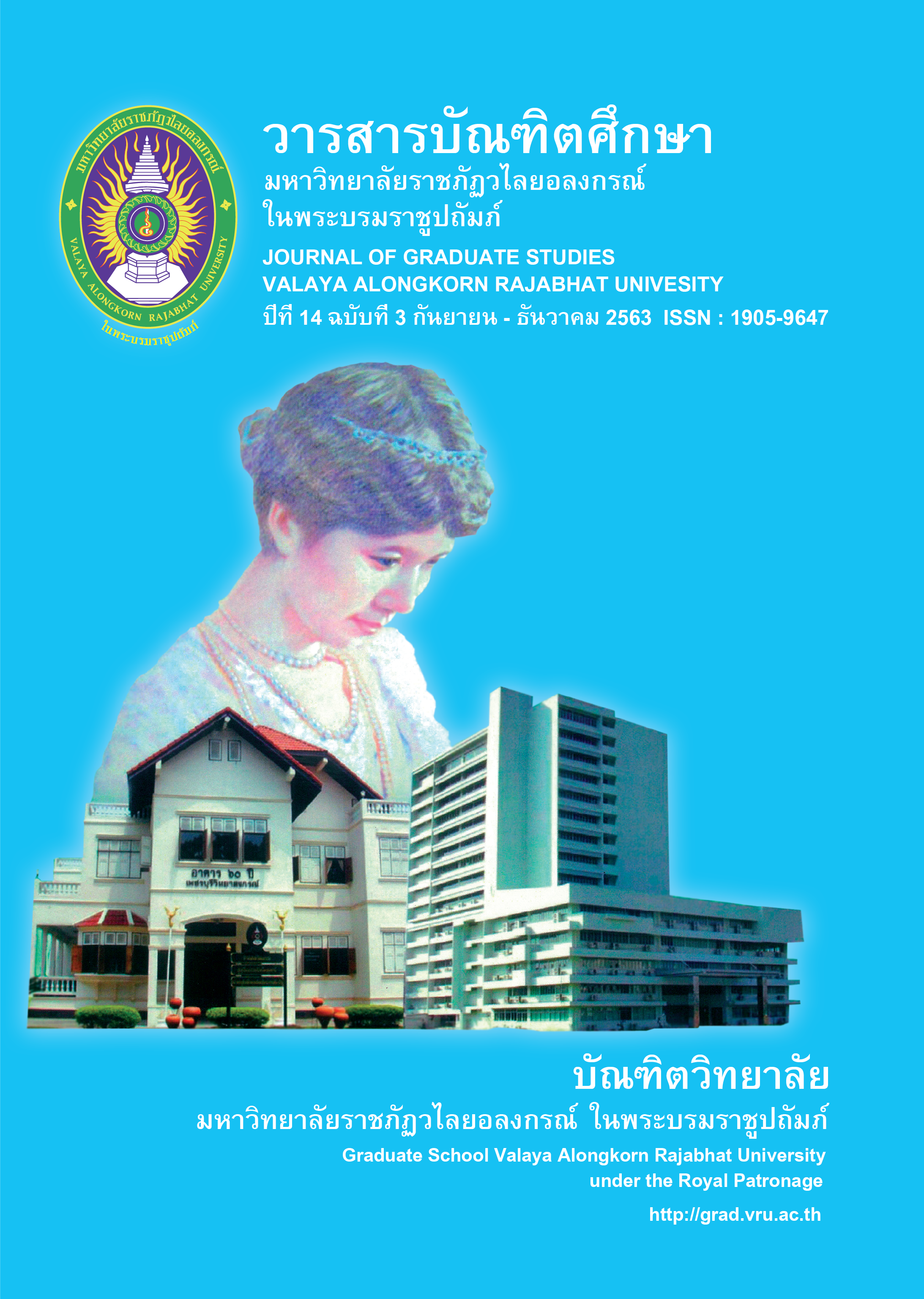AN ANALYSIS OF PARENTS’ THAI WAY OF LIFE CHILD REARING: A CASE STUDY OF THE CENTRAL REGION
Main Article Content
Abstract
The purpose of this research were 1) to study of Thai way of life child rearing 2) to compare Thai way of life child rearing in the central region which classified by gender, educational level and occupation. The sample group in this research was 420 people. The instrument in this research was a questionnaire for Thai way of life child rearing by analyzing the average standard deviation Content analysis T-test and F-test with one-way analysis of variance.
The research found that: 1. The Child rearing in accordance with the Thai way of life of the parents in general was at a moderate level ( M = 2.12, S.D. = 0.19). When considering each aspect, it was found that the highest mean was parenting. Early childhood education according to the Thai way of life in care-oriented style, followed by primary-care children in the Thai way of life in a care-based style. Parenting of young children in accordance with Thai ways of life in controlled parenting and parenting of young children in accordance with Thai ways of life in neglected parenting, respectively. 2. The result of comparing the parents’ Thai way of life child rearing in the central region which was classified by gender and educational levels found that. 2.1 Parents’ Thai way of life child rearing according to Thai way of life weren’t different between male and female parents. 2.2 Parents’ Thai way of life child rearing according to Thai way of life weren’t different between educational levels.
Article Details

This work is licensed under a Creative Commons Attribution-NonCommercial-NoDerivatives 4.0 International License.
บทความทุกเรื่องได้รับการตรวจความถูกต้องทางวิชาการโดยผู้ทรงคุณวุฒิ ทรรศนะและข้อคิดเห็นในบทความ Journal of Global of Perspectives in Humanities and Social Sciences (J-GPHSS) มิใช่เป็นทรรศนะและความคิดของผู้จัดทำจึงมิใช่ความรับผิดชอบของบัณฑิตวิทยาลัย มหาวิทยาลัยราชภัฏวไลยอลงกรณ์ ในพระบรมราชูปถัมภ์ กองบรรณาธิการไม่สงวนสิทธิ์การคัดลอก แต่ให้อ้างอิงแหล่งที่มา
References
Athawirat, S. et al. (1991). kān ʻoprom līangdū dek tām withī chīwit Thai [Parenting children according to Thai way of life]. Bangkok: Chulalongkorn University.
Bandura, A. (1986). Social Foundation of Thought and Action: A social cognitive theory. Englewood Cliffs: Prentice–Hall.
Baumrind, D. (1971). Current Patterns of Parental Authority. Developmental Psychology Monongraphs. 4, 1-103.
Bee, H. (1995). The growing child. New York: Harpa Collin Publishing. p.244, 37335.
Canter, L. & Center, M. (1992). Lee Canter's Assertive Discipline: Positive Behavior Management for Today's Classroom. United Kingdom.
Chareonasilp, T. (2017). phǣn patibatkān kān khapkhlư̄an čhut nēn chœ̄ng nayōbāi ratthamontrī wākān krasūang sưksāthikān [Action plan for driving the focus on policy Minister of Education]. Retrieves from https://www.moe.go.th/moe/th/news/detail.
Chotamra, L. (2016). sī čhaofā [Si Chao Fah]. Bangkok: Kantana.
Erikson, E. H. (1978). Experience in Science for Young Children. New York: A Division of Litton Educational Publishing.
Freud, S. (1856-1939). Group Psychology and the Analysis of the Ego Sigmund Freud. New York: Bantam Books.
Kaemkate, W. (2008). withī witthayākān wičhai thāng phrưttikam sāttra [Behavioral Science Research Methodology]. Bangkok: Chulalongkorn University Printing House.
Ministry of Education. (2017). khūmư̄ laksūt kānsưksā pathommawai Phutthasakkarāt 2560 [Course Guide Early Childhood Education 2017]. Bangkok: Kurusapa Ladprao.
Office of the Basic Education Commission. (2018). sathān sưksā nai sangkat khēt phư̄nthī kānsưksā nakngān khana kammakān kānsưksā naphư̄n thān [Educational institutions under educational service areas Office of the Basic Education Commission]. Bangkok: Office of the Basic Education Commission.
Rakvigai, W. (1997). kān ʻoprom līangdū dek pathommawai [Parenting young children]. Bangkok: Ton Aor Grammy.
Sukkrarerk, P. (2007). kān ʻopromlīangdū dek [Parenting of children]. Bangkok: Future Publishing.


